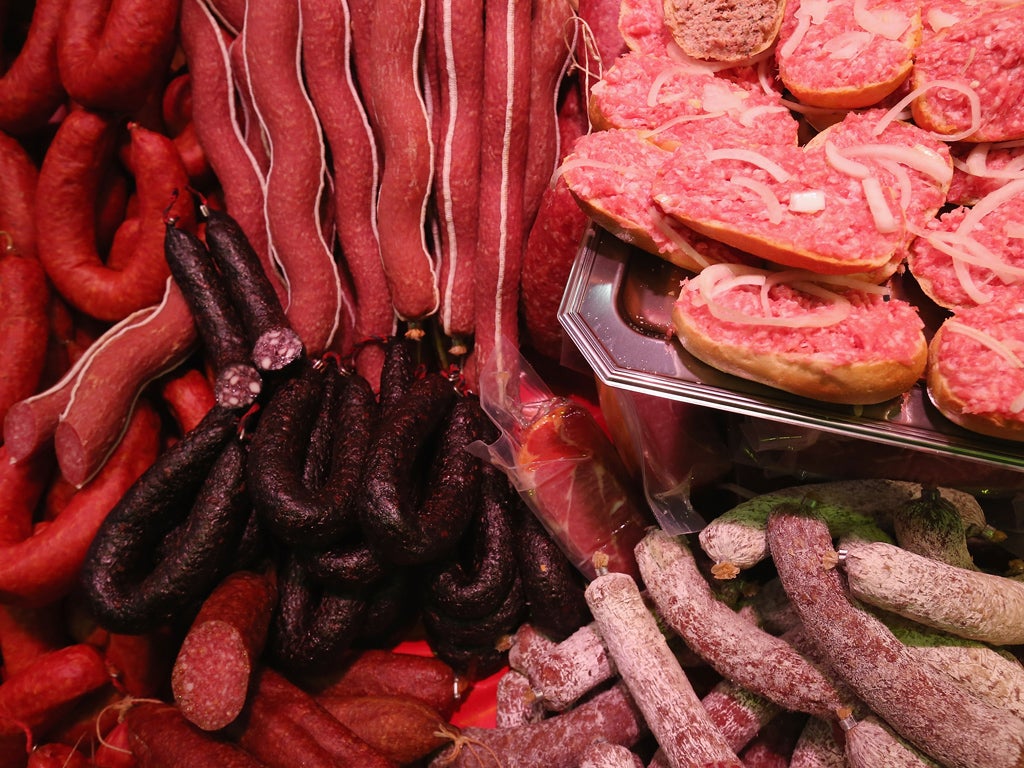World Cancer Day: How meat can be murder
Warnings are now added to cigarettes, but what about meat consumption?

Today is World Cancer Day.
When you consider the efforts to fight cancer, the image that most readily springs to mind might be the graphic warning labels added to cigarette packets sold in the UK and other countries, which have helped curb smoking and its associated health risks. Similar warnings should be placed on meat and dairy products for the same reason. Unlike foods from plants that enhance our health, meat and dairy products have the same hazards as cigarette smoking, including increased risks of strokes, heart disease and cancer.
According to Cancer Research statistics, nearly 425,000 cases of cancer were diagnosed across the UK in 2010, the most recent year of complete statistics – and more than 150,000 Britons died from the disease that same year. The World Health Organisation has determined that dietary factors account for at least 30 per cent of all cancer in Western countries and up to 20 per cent in developing countries.
Processed meat, such as bacon, sausage, ham, and the like, is so strongly linked with bowel cancer – the second-largest cause of cancer death in the UK – that no one should ever eat it, according to a recent report by the World Cancer Research Fund and the American Institute for Cancer Research, based on a systematic review of more than 1,000 papers on bowel cancer carried out at Imperial College London.
Countries with a higher intake of fat, especially fat from animals, such as meat and dairy products, have a higher incidence of breast cancer. Analysis of data from almost 15,000 male physicians found that men who consumed red meat at least five times per week had a higher risk of developing prostate cancer than men who ate red meat less than once per week. Other studies have concluded that meat consumption may increase the risk of kidney and pancreatic cancer.
A number of explanations have been advanced to link meat and cancer risk. In some cases, meat contains carcinogenic compounds formed during processing or cooking. In addition, the high fat content of meat and dairy products boosts hormone production, which increases the risk of hormone-related cancer, such as breast and prostate cancer.
If this information leads you to think of your fork as a powerful weapon, you're on the right track: it can defend you against cancer. It all depends on how you choose to load it.
Plant foods are rich in fibre, which speeds the passage of food through the colon, effectively removing carcinogens and changing the type of bacteria present in the intestine to reduce the production of carcinogenic acids. Vitamin C, an antioxidant found in citrus fruits and many vegetables, may lower risks for cancer of the esophagus and stomach by neutralising cancer-causing chemicals formed in the body and blocking the conversion of nitrates to carcinogenic nitrosamines in the stomach.
Carotenoids, the pigments that give fruits and vegetables their colors, have also been shown to help protect against lung cancer and may help prevent cancer of the bladder, mouth, larynx, esophagus and breast as well. Vegetables such as cabbage, broccoli, kale, turnips, cauliflower and Brussels sprouts contain flavonoids and indoles, thought to have anti-cancer activities. The soya foods enjoyed by many vegans contain anticarcinogens, including lignans and phytoestrogens.
Results from the UK cohort of the landmark European Prospective Investigation Into Cancer and Nutrition (EPIC) study found prominent differences between British meat-eaters and vegans. Vegans had less than half the mean intake of saturated fatty acids of participants who ate meat as well as the highest intakes of fibre, vitamin C and vitamin E.
Small wonder, then, that studies in England and Germany have shown that vegetarians are about 40 per cent less likely to develop cancer compared to meat-eaters.
Quitting smoking remains an important way to reduce cancer risks, but giving meat, eggs and dairy products the boot is just as vital. Consider this information food for thought.
Join our commenting forum
Join thought-provoking conversations, follow other Independent readers and see their replies
Comments
Bookmark popover
Removed from bookmarks